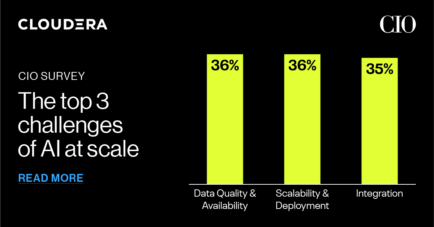At a time when AI is exploding in reputation and discovering its method into practically each side of enterprise operations, knowledge has arguably by no means been extra priceless. Extra lately, that worth has been made clear by the emergence of AI-powered applied sciences like generative AI (GenAI) and using Massive Language Fashions (LLMs). However, even with the backdrop of an AI-dominated future, many organizations nonetheless discover themselves fighting every little thing from managing knowledge volumes and complexity to safety considerations to quickly proliferating knowledge silos and governance challenges.
As organizations proceed to navigate this AI-driven world, we got down to perceive the methods and rising knowledge architectures which can be defining the long run. To do that, Cloudera commissioned a examine with Foundry, Information Structure and Technique within the AI Period, surveying over 600 IT decision-makers in North America, northern Europe area of EMEA, and APAC.
Let’s discover a few of the most essential findings that the survey uncovered.
Tapping into AI’s Full Potential
 It’s not simply hype and speak relating to AI—a majority of surveyed respondents (three out of 5) mentioned their organizations have been not less than within the early levels of adopting AI of their operations whereas solely eight p.c mentioned that they had but to make any plans for AI adoption. And of these organizations engaged on some stage of AI adoption, a couple of of the highest advantages included elevated productiveness (35%), enhanced operational effectivity (33%), improved buyer expertise (33%), and optimized provide chain and logistics (33%).
It’s not simply hype and speak relating to AI—a majority of surveyed respondents (three out of 5) mentioned their organizations have been not less than within the early levels of adopting AI of their operations whereas solely eight p.c mentioned that they had but to make any plans for AI adoption. And of these organizations engaged on some stage of AI adoption, a couple of of the highest advantages included elevated productiveness (35%), enhanced operational effectivity (33%), improved buyer expertise (33%), and optimized provide chain and logistics (33%).
The advantages are clear, and there’s loads of potential that comes with AI adoption. However that doesn’t imply it’s all easy crusing for organizations placing AI into observe. Among the many commonest challenges to reaching AI adoption at scale have been knowledge high quality and availability (36%), scalability and deployment (36%), integration with present techniques and processes (35%), and alter administration and organizational tradition (34%). In the end, relating to reaching the total potential of AI, the organizations which can be capable of overcome these complexities and discover, classify, and expose knowledge to the proper folks will have the ability to discover sustained success at scale.
Mapping Out the Keys to Success
The trail to efficiently implementing AI at enterprise scale is constructed on three essential parts: fashionable knowledge structure, unified knowledge administration, and versatile, safe knowledge platforms. Of surveyed respondents, corporations which can be main the way in which towards AI adoption are specializing in these three areas.
- Fashionable knowledge structure: A versatile strategy is essential for constructing a contemporary structure, with IT leaders recognizing the significance of knowledge lakes or lakehouses for managing the big volumes of unstructured and semistructured knowledge required for AI mannequin coaching. In reality, two thirds of respondents agreed that knowledge lakehouses have been essential to lowering pipeline complexity.
- Unified knowledge administration: Survey respondents overwhelmingly (90%) understood the significance of unifying their knowledge lifecycle on a single platform as a vital a part of analytics and AI. And practically half (46%) of surveyed IT leaders mentioned their group interacts with each stage of the info lifecycle course of. Gaining full management and visibility into each side of knowledge offers IT leaders the capabilities wanted to drive AI-fueled innovation.
- Versatile, safe knowledge platforms: From a long-term perspective, a hybrid knowledge administration strategy, together with each on-prem and public cloud infrastructure and knowledge technique, is the popular path ahead. Whereas just one third of respondents at present deploy multicloud or hybrid knowledge architectures, 93% of these respondents agreed that “multicloud and hybrid capabilities for knowledge and analytics are key for a corporation to adapt to vary.”
The potential of AI is very large and is rapidly shifting from the theoretical into precise implementation throughout an unlimited variety of companies. And because it does, having a contemporary knowledge structure is proving to be a essential, foundational, a part of efficiently scaling the expertise and reaching its full potential—one thing that the survey outcomes reveal and that IT leaders are aware of inside their very own organizations. In the end the organizations that efficiently implement AI might be these which can be capable of display excessive ranges of confidence in coaching knowledge, mannequin integrity, and respect for safety and privateness.
Take a look at the total survey report for added insights into the way forward for AI and knowledge structure.


